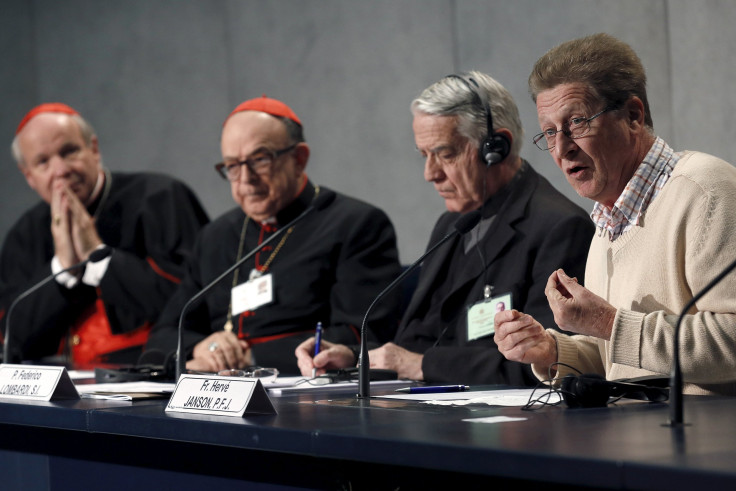Vatican Family Synod 2015: Highlights Of Pope Francis' Speech Criticizing Bishops, After Stalemate Over Divorcees And Gays

Who belongs in the Catholic Church? After a three-week global synod on family life that concluded at Vatican City Saturday, bishops remained divided over that deceptively simple question, ending in a stalemate over the role of the divorced and remarried as well as gay Catholics in the church. At the end of the gathering, Pope Francis lambasted bishops for "burying [their] heads in the sand," among other things. Read highlights from his address below:
Dear beatitudes, eminences and excellencies, dear brothers and sisters,
I would like first of all to thank the Lord, who has guided our synodal process in these years by his Holy Spirit, whose support is never lacking to the church.
...
As I followed the labors of the synod, I asked myself: What will it mean for the church to conclude this synod devoted to the family?
Certainly, the synod was not about settling all the issues having to do with the family, but rather attempting to see them in the light of the Gospel and the church’s tradition and 2,000-year history, bringing the joy of hope without falling into a facile repetition of what is obvious or has already been said.
Surely it was not about finding exhaustive solutions for all the difficulties and uncertainties which challenge and threaten the family, but rather about seeing these difficulties and uncertainties in the light of the faith, carefully studying them and confronting them fearlessly, without burying our heads in the sand.
It was about urging everyone to appreciate the importance of the institution of the family and of marriage between a man and a woman, based on unity and indissolubility, and valuing it as the fundamental basis of society and human life.
It was about listening to and making heard the voices of the families and the church’s pastors, who came to Rome bearing on their shoulders the burdens and the hopes, the riches and the challenges of families throughout the world.
It was about showing the vitality of the Catholic Church, which is not afraid to stir dulled consciences or to soil her hands with lively and frank discussions about the family.
It was about trying to view and interpret realities, today’s realities, through God’s eyes, so as to kindle the flame of faith and enlighten people’s hearts in times marked by discouragement, social, economic and moral crisis, and growing pessimism.
...
It was also about laying closed hearts, which bare the closed hearts which frequently hide even behind the church’s teachings or good intentions, in order to sit in the chair of Moses and judge, sometimes with superiority and superficiality, difficult cases and wounded families.
It was about making clear that the church is a church of the poor in spirit and of sinners seeking forgiveness, not simply of the righteous and the holy, but rather of those who are righteous and holy precisely when they feel themselves poor sinners.
It was about trying to open up broader horizons, rising above conspiracy theories and blinkered viewpoints, so as to defend and spread the freedom of the children of God, and to transmit the beauty of Christian newness, at times encrusted in a language which is archaic or simply incomprehensible.
In the course of this synod, the different opinions which were freely expressed -- and at times, unfortunately, not in entirely well-meaning ways -- certainly led to a rich and lively dialogue; they offered a vivid image of a church which does not simply “rubberstamp,” but draws from the sources of her faith living waters to refresh parched hearts.
And -- apart from dogmatic questions clearly defined by the church’s Magisterium -- we have also seen that what seems normal for a bishop on one continent, is considered strange and almost scandalous for a bishop from another; what is considered a violation of a right in one society is an evident and inviolable rule in another; what for some is freedom of conscience is for others simply confusion.
...
Dear Brothers,
The synod experience also made us better realize that the true defenders of doctrine are not those who uphold its letter, but its spirit; not ideas but people; not formulae but the gratuitousness of God’s love and forgiveness.
...
The church’s first duty is not to hand down condemnations or anathemas, but to proclaim God’s mercy, to call to conversion, and to lead all men and women to salvation in the Lord.
...
In light of all this, and thanks to this time of grace which the church has experienced in discussing the family, we feel mutually enriched. Many of us have felt the working of the Holy Spirit who is the real protagonist and guide of the synod. For all of us, the word “family” has a new resonance, so much so that the word itself already evokes the richness of the family’s vocation and the significance of the labors of the synod.
In effect, for the church to conclude the synod means to return to our true “journeying together” in bringing to every part of the world, to every diocese, to every community and every situation, the light of the Gospel, the embrace of the church and the support of God’s mercy.
Thank you.
© Copyright IBTimes 2024. All rights reserved.












